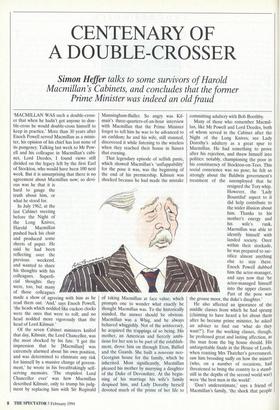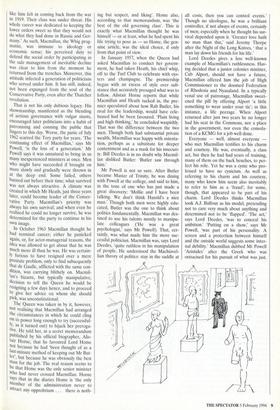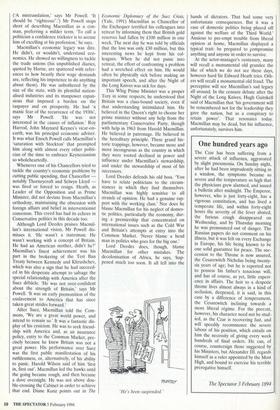CENTENARY OF A DOUBLE-CROSSER
Simon Heifer talks to some survivors of Harold Macmillan's Cabinets, and concludes that the former Prime Minister was indeed an old fraud
'MACMILLAN WAS such a double-cross- er that when he hadn't got anyone to dou- ble-cross he would double-cross himself to keep in practice.' More than 30 years after Enoch Powell served Macmillan as a minis- ter, his opinion of his chief has lost none of its pungency. Talking last week to Mr Pow- ell and his colleague in Macmillan's cabi- net, Lord Deedes, I found views still divided on the legacy left by the first Earl of Stockton, who would have been 100 next week. But it is unsurprising that there is no agreement about Macmillan now; so devi- ous was he that it is hard to gauge the truth about him, or what he stood for.
In July 1962, at the last Cabinet meeting before the Night of the Long Knives, Of the seven Cabinet ministers knifed that day, Kilmuir, the Lord Chancellor, was the most shocked by his fate. 'I got the impression that he [Macmillan] was extremely alarmed about his own position, and was determined to eliminate any risk for himself by a massive change of govern- ment,' he wrote in his breathtakingly self- serving memoirs. 'The stupidest Lord Chancellor ever' was how Macmillan described Kilmuir, only to trump his judg- ment by replacing him with Sir Reginald Manningham-Buller. So angry was Kil- muir's three-quarters-of-an-hour interview with Macmillan that the Prime Minister forgot to tell him he was to be advanced to an earldom; he and his wife, still stunned, discovered it while listening to the wireless when they reached their house in Sussex that evening.
That legendary episode of selfish panic, which showed Macmillan's 'unflappability' for the pose it was, was the beginning of the end of his premiership. Kilmuir was shocked because he had made the mistake
of taking Macmillan at face value; which prompts one to wonder what exactly he thought Macmillan was. To the historically minded, the answer should be obvious. Macmillan was a Whig, and he always behaved whiggishly. Not of the aristocracy, he acquired the trappings of so being. His mother, an American and fiercely ambi- tious for her son to be part of the establish- ment, drove him on through Eton, Balliol and the Guards. She built a nouveau neo- Georgian house for the family, which he inherited. Most significantly, Macmillan pleased his mother by marrying a daughter of the Duke of Devonshire. At the begin- ning of his marriage his wife's family despised him, and Lady Dorothy herself devoted much of the prime of her life to
committing adultery with Bob Boothby.
Many of those who remember Macmil- lan, like Mr Powell and Lord Deedes, both of whom served in the Cabinet after the Night of the Long Knives, see Lady Dorothy's adultery as a great spur to Macmillan. He had something to prove after his rejection, and threw himself into politics: notably, championing the poor in his constituency of Stockton-on-Tees. This social conscience was no pose; he felt so strongly about the Baldwin government's treatment of the unemployed that he resigned the Tory whip. However, the 'Lady Bountiful' aspect to it did help contribute to the wider illusion about him. Thanks to his mother's energy and his wife's rank, Macmillan was able to identify himself with landed society. Once within their stockade, he was prepared to sac- rifice almost anything else to stay there. Enoch Powell dubbed him the actor-manager, and says now that 'he actor-managed himself into the upper classes. Part of the pose was the grouse moor, the duke's daughter.'
He also affected an ignorance of the middle classes from which he had sprung (claiming to have heard a lot about them after he became prime minister, he asked an adviser to find out 'what do they want?'). For the working classes, though, he professed great and lasting affection, as the man from the big house should. His unforgettable finale in the House of Lords, when roasting Mrs Thatcher's government, saw him brooding sadly on how the miners (who, on a number of occasions, had threatened to bring the country to a stand- still in the depths of the second world war) were 'the best men in the world'.
`Don't underestimate,' says a friend of Macmillan's family, 'the shock that people like him felt in coming back from the war in 1919. Their class was under threat. His whole career was dedicated to keeping the lower orders sweet so that they would not do what they had done in Russia and Ger- many.' As such, Macmillan, the Whig prag- matist, was immune to ideology or economic sense; his perceived duty to defend the social order by participating in the safe management of inevitable decline was clear to him from the moment he returned from the trenches. Moreover, this attitude infected a generation of politicians who served under him. It has still, indeed, not been expunged from the soul of the Conservative Party, even after the Thatcher revolution.
That is not his only dubious legacy. His showmanship, manifested as the blending of serious governance with vulgar stunts, encouraged later politicians into a habit of patronising and conning the public that lingers to this day. Worse, the panic of July 1962 scarred the Tory party for years. 'The continuing effect of Macmillan,' says Mr Powell, 'is the loss of a generation.' Mr Powell says it was unnatural to bring in so many inexperienced ministers at once. Men who might have succeeded if brought on more slowly and gradually were thrown in at the deep end. Some failed, others burned out before their time; what survived was not always attractive. A climate was created in which Mr Heath, just three years later, could become leader of the Conser- vative Party. Macmillan's priority was always his own survival; and when even he realised he could no longer survive, he was determined for the party to continue in his own image.
In October 1963 Macmillan thought he had terminal cancer; either he panicked again, or, for actor-managerial reasons, the idea was allowed to get about that he was much more ill than he was. He was certain- ly furious to have resigned over a mere prostate problem, only to find subsequently that de Gaulle, afflicted with the same con- dition, was carrying blithely on. Macmil- lan's bizarre, but typically manipulative, decision to tell the Queen he would be resigning a few days hence, and to proceed to give her advice on whom she should pick, was unconstitutional.
The Queen was taken in by it, however, not realising that Macmillan had arranged the circumstances in which he could cling
00 to power long enough to try (successful- ly, as it turned out) to hijack her preroga-
tive. He told her, in a secret memorandum published by his official biographer, Alis- tair Home, that he favoured Lord Home not because he had 'been thought of as a last-minute method of keeping out Mr But- ler', but because he was obviously the best man for the job. The real reason seems to be that Home was the only senior minister who had never crossed Macmillan. Home says that in the diaries Home is 'the only member of the administration never to attract any opprobrium . . . there is noth- ing but respect, and liking'. Home also, according to that memorandum, was 'the best of the old governing class'. This is exactly what Macmillan thought he was himself — or at least, what he had spent his life trying to pose as — so Home, the gen- uine article, was the ideal choice, if only from that point of view.
In January 1957, when the Queen had asked Macmillan to conduct her govern- ment, he had taken Heath, his chief whip, off to the Turf Club to celebrate with oys- ters and champagne. The premiership began with an excess of style over sub- stance that accurately presaged what was to follow. Alistair Home reports that while Macmillan and Heath tucked in, the pre- mier speculated about how Rab Butler, his rival for the leadership, would have cele- brated had he been favoured. 'Plain living and high thinking,' he concluded waspishly. That was the difference between the two men. Though both had substantial private wealth, Macmillan was happy with ostenta- tion, perhaps as a substitute for deeper contentment and as a mask for his insecuri- ty. Bill Deedes is in no doubt why Macmil- lan disliked Butler: 'Butler saw through him.'
Mr Powell is not so sure. After Butler became Master of Trinity, he was dining with Powell at the college, and said to him, in the tone of one who has just made a great discovery: 'Mollie and I have been talking. We don't think Harold's a nice man.' Though both men were highly edu- cated, Butler was the one to think about politics fundamentally. Macmillan was des- tined to use his talents mostly to manipu- late colleagues ('He was a great psychologist,' says Mr Powell). That, cer- tainly, was what made him the more suc- cessful politician. Macmillan was, says Lord Deedes, 'quite ruthless in his manipulation of people. He understood the Machiavel- lian theory of politics: stay in the saddle at all costs, then you can control events.' Though no ideologue, he was a brilliant controller, if not always of events, certainly of men; especially when he thought his sur- vival depended upon it. 'Greater love hath no man than this,' said Jeremy Thorpe after the Night of the Long Knives, ' that a man lay down his friends for his life.'
Lord Deedes gives a less well-known example of Macmillan's ruthlessness. Hav- ing decided that a junior colonies minister, Cub Alport, should not have a future, Macmillan offered him the job of High Commissioner to the doomed Federation of Rhodesia and Nyasaland. In a typically venal use of patronage, Macmillan sweet- ened the pill by offering Alport 'a little something to wear under your tie'; in this instance, a life peerage. When Alport returned after just two years he no longer had his seat in the Commons, nor a place in the government, nor even the consola- tion of a KCMG for a job well done.
Everyone — well, almost everyone who met Macmillan testifies to his charm and courtesy. He was, eventually, a class act, but then he had had years of training, many of them on the back benches, to per- fect his role. Yet he was a cynic who pro- fessed to have no cynicism. As well as referring to his charm and his courtesy, many who knew him seem also inevitably to refer to him as a 'fraud', for some, though, that appeared to be part of his charm. Lord Deedes thinks Macmillan took A.J. Balfour as his model, pretending not to care very much about anything and determined not to be 'flapped'. 'The act,' says Lord Deedes, 'was to conceal his ambition.' Putting on a show,' says Mr Powell, 'was part of his personality. A screen and a protection between himself and the outside world suggests some inter- nal debility.' Macmillan dubbed Mr Powell `Aristides' after the Greek who was ostracised for his pursuit of what was just. CA mistranslation,' says Mr Powell. 'It should be "righteous".') Mr Powell stops short of describing Macmillan as a con- man, preferring a milder term. `To call a politician a confidence trickster is to accuse him of excelling at his profession,' he says.
Macmillan's economic legacy was dire. He didn't, or wouldn't, understand eco- nomics. He showed no willingness to tackle the trade unions (his unpublished diaries, quoted by Home, are spattered with refer- ences to how beastly their wage demands are, reflecting his impotence to do anything about them). He was unbothered by the size of the state, with its plentiful nation- alised industries and its manpower expan- sions that imposed a burden on the taxpayer and on prosperity. He had 'a manic fear of the recurrence of the 1930s', says Mr Powell. 'He was not interested in the causes of inflation.' Roy Harrod, John Maynard Keynes's vicar-on- earth, was his principal economic adviser. It was what Enoch Powell calls Macmillan's `saturation with Stockton' that prompted him along with almost every other politi- cian of the time to embrace Keynesianism so wholeheartedly.
Whenever one of his Chancellors tried to tackle the country's economic problems by cutting public spending, that Chancellor notably Thorneycroft and Selwyn Lloyd was fired or forced to resign. Heath, as Leader of the Opposition and as Prime Minister, did not deviate from Macmillan's orthodoxy, maintaining the obsession with foreign affairs and belief in interventionist consensus. This creed has had its echoes in Conservative politics in this decade too.
Although Lord Deedes praises Macmil- lan's international vision, Mr Powell dis- misses it. 'He wasn't a statesman. He wasn't working with a concept of Britain. He had an American mother, didn't he?' Macmillan's finest achievement was his part in the brokering of the Test Ban Treaty between Kennedy and Khrushchev, which was also a sign that he had succeed- ed in his desperate attempt to salvage the special relationship with America after the Suez debacle. 'He was not over-confident about the strength of Britain,' says Mr Powell. 'It was an early premonition of the enslavement to America that has since taken great strides forward.'
After Suez, Macmillan told the Com- mons, 'We are a great world power, and intend to remain so.' It was a fantastic dis- play of his cynicism. He was to seek friend- ship with America and, as an insurance policy, entry to the Common Market, pre- cisely because he knew Britain was not a great power. His performance over Suez was the first public manifestation of his ruthlessness, or, alternatively, of his ability to panic. Harold Wilson said of him 'first in, first out'. Macmillan led the hawks until the going became rough, and then became a dove overnight. He was not above dou- ble-crossing the Cabinet in order to achieve that end. Diane Kunz points out in The Economic Diplomacy of the Suez Crisis, (Yale, 1991) Macmillan as Chancellor of the Exchequer terrified his colleagues into retreat by informing them that British gold reserves had fallen by £100 million in one week. The next day he was told by officials that the loss was only £30 million, but this interesting news he kept from his col- leagues. When he did not panic into retreat, the effort of confronting a problem had a wretched effect on him. He would often be physically sick before making an important speech, and after the Night of the Long Knives was sick for days.
This Whig Prime Minister was a proper Tory in some respects; he understood that Britain was a class-bound society, even if that understanding intimidated him. He believed in the Queen's right to choose her prime minister without any help from the parliamentary Conservative Party, though with help in 1963 from Harold Macmillan. He believed in patronage. He believed in the hereditary principle. These grand his- toric trappings, however, became more and more incongruous as the country in which they were rooted declined in power and influence under Macmillan's stewardship, and under the stewardship of most of his successors.
Lord Deedes defends his old boss. 'You have to relate politicians to the circum- stances in which they find themselves. Macmillan was highly sensitive to all strands of opinion. He had a genuine rap- port with the working class.' Nor does he blame Macmillan for his neglect of domes- tic politics, particularly the economy, dur- ing a premiership that concentrated on international issues such as the Cold War and Britain's attempts at entry into the Common Market. 'Never blame a head man in politics who goes for the big one.'
Lord Deedes does, though, blame Macmillan for other mistakes. The decolonisation of Africa, he says, 'hap- pened much too soon. It all fell into the 'He's been suspended.' hands of dictators. That had some very unfortunate consequences. But it was a case of domestic politics being played off against the welfare of the Third World.' Anxious to pre-empt trouble from liberal opinion at home, Macmillan displayed a typical trait: be prepared to compromise anything and anyone in order to survive.
At the actor-manager's centenary, many will recall a monumental old grandee the like of which we do not see these days, however hard Sir Edward Heath tries. Oth- ers will recall a monumental old fraud. The perceptive will see Macmillan's sad legacy all around. In the censure debate after the Night of the Long Knives, Hugh Gaitskell said of Macmillan that 'his government will be remembered not for the leadership they gave the nation, but as a conspiracy to retain power'. That resonates today. Macmillan may be dead, but his influence, unfortunately, survives him.




















































 Previous page
Previous page